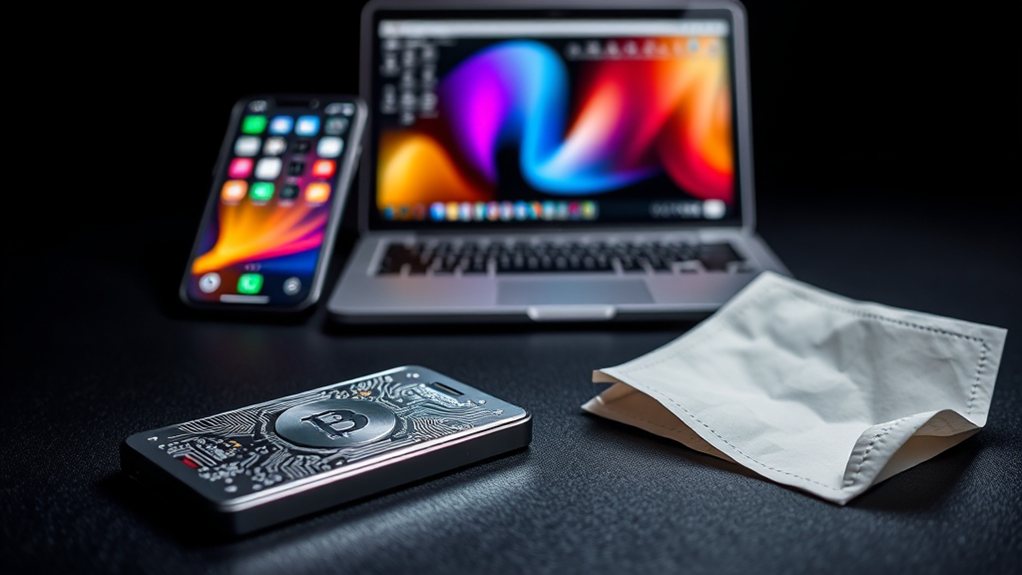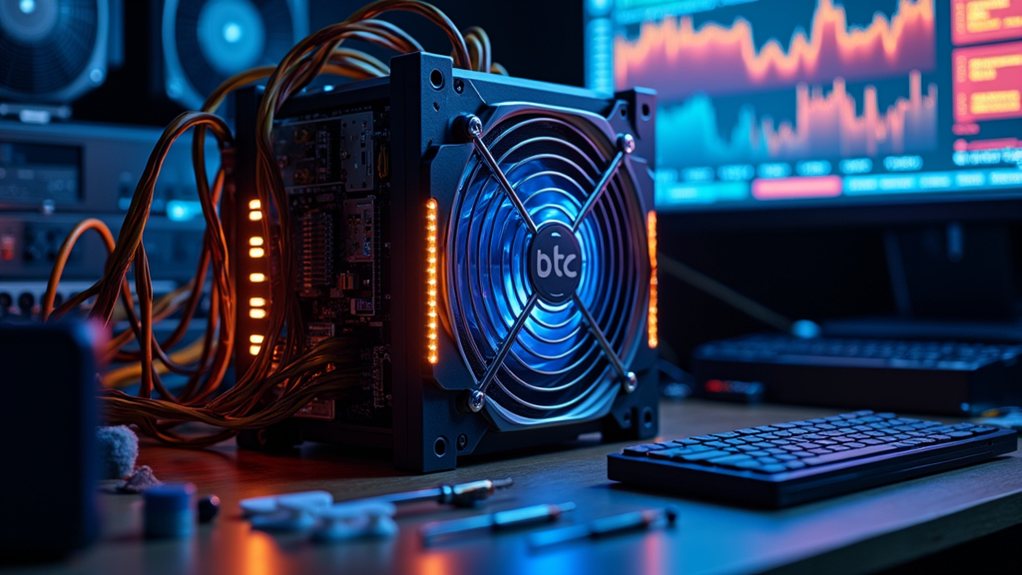Crypto wallets come in several varieties, each with distinct security profiles. Hot wallets stay connected to the internet—convenient but vulnerable. Cold wallets remain offline, offering superior protection for serious investors. Users can choose between custodial options (where companies hold your keys) and non-custodial solutions (full user control). Software wallets work on phones and browsers, while hardware devices like Ledger physically secure private keys. The right choice depends on how much you value sleeping at night.

While traditional wallets hold cash and cards, crypto wallets serve a far more complex purpose in the digital domain. These specialized tools don't actually store cryptocurrencies—surprise! They store private keys, those secret codes that give access to your blockchain assets. Think of them as your digital passport to the wild west of cryptocurrency. They let users send, receive, and manage various digital currencies while connecting to blockchain networks. And yes, they're your ticket to those fancy DeFi applications everyone keeps talking about.
Crypto wallets come in different flavors. Hot wallets stay connected to the internet—convenient but slightly risky. Cold wallets remain offline—safer but less convenient. It's the classic security-versus-accessibility tradeoff. Some people prefer custodial wallets where companies hold their keys. Bold move, trusting someone else with your digital fortune. Non-custodial wallets put you in complete control. Total freedom. Total responsibility. Multi-signature wallets need multiple approvals for transactions, like getting signatures from your business partners before spending company funds.
Choosing a wallet isn't just about tech—it's about how much control you want versus convenience you need.
Software wallets dominate the market. Desktop applications like Exodus and Electrum. Mobile apps like Trust Wallet and Mycelium for on-the-go transactions. Browser extensions like MetaMask that integrate right into your web experience. They're usually free. They're convenient. They're perfect for everyday crypto use. Not perfect for your life savings, though.
Hardware wallets offer serious security upgrades. Ledger Nano X, Trezor Model T, KeepKey—these physical devices keep private keys offline and away from hackers. They're not free, typically costing between $50 and $200. Worth every penny if you've got substantial crypto holdings. They support multiple currencies too, so your Bitcoin and Ethereum can live happily together. Many users choose these for their ability to sign transactions offline, adding an essential layer of security against online threats. The Ledger Nano X offers additional features like smart card encryption for enhanced protection of your digital assets.
Paper wallets? Old school but effective. Literally printed pieces of paper with your public and private keys. Generate them offline for maximum security. Just don't get them wet, torn, burned, or lost. And definitely don't let your dog eat them. They're becoming obsolete as hardware wallets improve, but some crypto purists still swear by them.
Multi-currency wallets like Exodus, Jaxx Liberty, and Atomic Wallet let you manage diverse crypto portfolios without juggling multiple applications. Self-custody wallets empower users with full autonomy over their digital assets without relying on third-party intermediaries. Many include built-in exchange features. Convenient, right? Just check which assets they support before committing.
Security remains paramount in the crypto world. Two-factor authentication, encryption, regular backups—all essential practices. Phishing attacks and malware target crypto users constantly. One wrong click and your digital fortune vanishes. The golden rule? Never, ever share your private keys or seed phrases. Not with friends, not with support staff, not with that nice prince who emailed you. No one.
Frequently Asked Questions
How Can I Recover My Wallet if I Forget My Password?
Wallet recovery options depend on the wallet type.
Got a recovery phrase? You're in luck. Just enter those 12-24 magic words into a new installation.
No phrase? Life gets harder. Custodial wallets might offer email-based password resets or security questions. Some wallets support backup files.
Professional recovery services exist too—they'll charge you, of course. Success not guaranteed.
Non-custodial wallet without a seed phrase? Tough break.
Are Hardware Wallets Immune to All Types of Hacking Attempts?
Hardware wallets aren't bulletproof. Period.
While they're considerably more secure than software alternatives, they remain vulnerable to several attack vectors.
Physical tampering, side-channel attacks, and social engineering are real threats. Some manufacturers overpromise on security.
The devices themselves might be tough to crack, but human error remains the weakest link.
A hardware wallet is just a tool – one that can be defeated by sophisticated attackers or plain old stupidity.
Can I Use Multiple Wallets for Different Cryptocurrencies?
Using multiple wallets for different cryptocurrencies isn't just possible—it's recommended.
Crypto users regularly maintain separate wallets for various needs. Hardware wallets for big holdings. Hot wallets for daily transactions. Coin-specific wallets for special features.
It's like having different bank accounts. More wallets means better organization and reduced risk. If one wallet gets compromised, you don't lose everything.
Simple strategy, really.
What Fees Are Associated With Different Wallet Types?
Wallet fees vary widely.
Hot wallets? Usually free with transaction fees (0.1-1%). Those exchanges nickel-and-dime you on withdrawals and deposits—typical.
Hardware wallets hit you upfront ($50-$200) but no recurring costs.
Multi-sig solutions cost the most, especially for setup and transactions.
Every wallet type slaps on network fees for blockchain transfers.
Volume traders get discounts, at least.
Nothing's truly free in crypto. Companies gotta make money somehow.
How Often Should I Update My Wallet Software?
Wallet updates vary wildly. Monthly checks are standard, but some wallets auto-update.
Can't be bothered? Well, enjoy your security vulnerabilities. Critical updates need immediate attention—ignore them at your peril.
Major updates typically drop 2-4 times yearly. The stakes? Pretty high.
Outdated software means exposure to known flaws, blockchain incompatibility, and potentially lost funds. Nobody wants that.
Updates matter.








